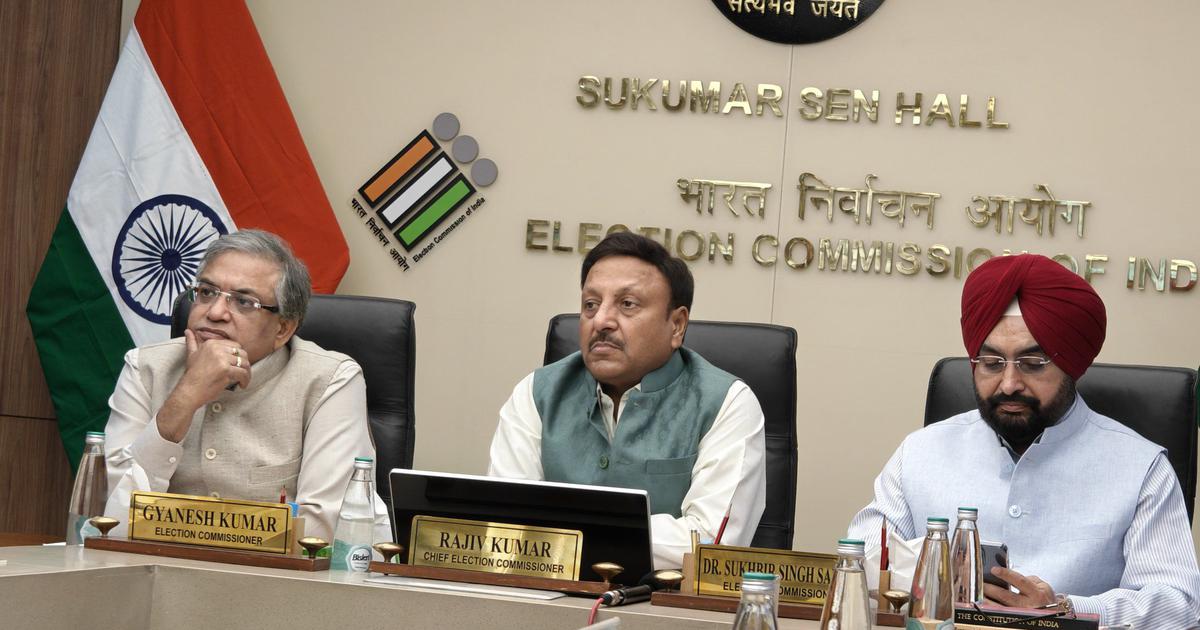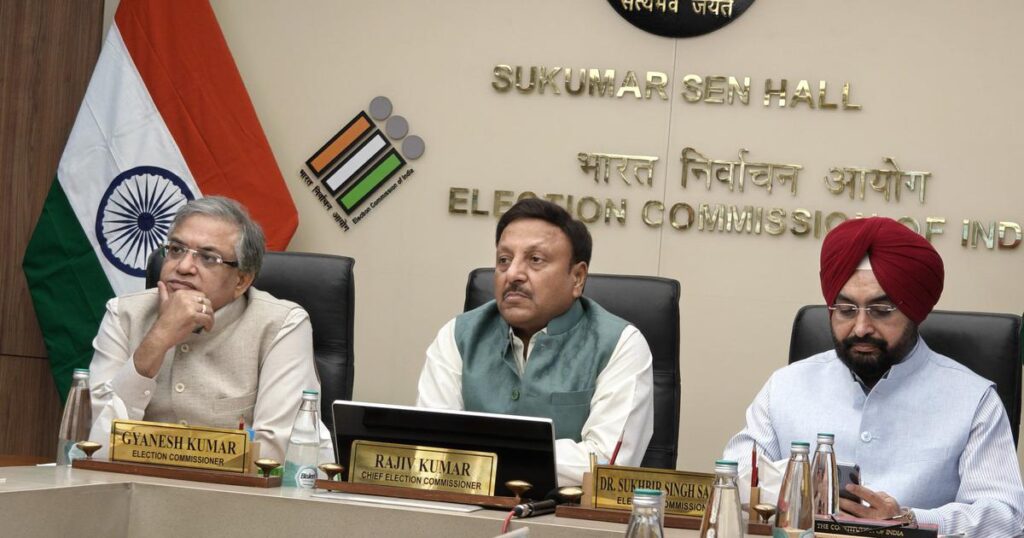


By Dr. Gyan Pathak
Election Commission of India’s order of June 24, 2025 for conducting Special Intensive Revision of Electoral Rolls in Bihar violates its core constitutional responsibility, and is contrary to the well-defined protocol and procedure, and hence whimsical.
In the note explaining the process of annual revision/updation of electoral rolls, the ECI has itself given the details, how to proceed with the procedure, but it is shocking that the constitution body itself acted against the details. It is simply a breach of trust of the citizens of India.
The creation, maintenance, and purification of Electoral Rolls is a core constitutional responsibility of ECI, and for that there has been a well-defined and meticulously followed legacy over the decades, which was not followed by the ECI while notifying its order. The process is ensconced in a watertight statutory scheme which is rule based.
The process of revision of electoral rolls says, “The electoral roll is prepared in accordance with the well-defined protocol &procedure and following the principle of natural justice by providing reasonable opportunity to the electors and all stakeholders, political parties in particular.”
Since, ECI is a constitutional body in a democracy, it is not supposed to change the “well-defined protocol & procedure” all of a sudden without deliberations with the stakeholders. ECI’s order mandating new rule for electors whose names were not in the 22 year old electoral roll of 2003 to prove not only citizenship of their own but also of their parents is a major change in the procedure, and hence it can’t be done violating the principle of natural justice.
India being a democratic country, ECI was supposed to democratically act if it had found the decades of legacy of “well-defined protocol & procedure” wrong. Deliberations with the political parties in a democracy was the minimum need as per the process of the revision of electoral rolls, since the provisions of the process of revision of electoral rolls make the ECI responsible for giving “reasonable opportunity to the electors and all stakeholders” in the process.
In the current instance, the ECI neither gave “reasonable opportunities” to electors nor the stakeholder political parties. One fine morning ECI rises from its sleep, and just makes an order to be followed by political parties and electors, forgetting that the responsibility given to the ECI is not autocratic but democratic, in which every elector and the political party is a participant, not servile ECI. Therefore, the order violates not only the rules of democracy but also the spirit of it. It is also against the “principle of natural justice”.
ECI has arbitrarily given a submission deadline for enumeration form and required documentation by July 25. The one month time is too short, and can’t be considered “reasonable opportunity” because the documents are not ready with crores of electors in the fist place, and then the large part of the state is under flood, farmers and farm labourers are busy because of sowing of Kharif crops, many are not able to move on account of their checked movement due to rains, flooded or disrupted paths and roads, and seasonal illness. It is against natural justice not give enough time to electors. The draft electoral roll will be released around August 1, followed by a claim and objection window until September 1, 2025. The final Revised Electoral Roll will be published on September 30, 2025.
Since electoral roll is part of a live process under the ECI, it is arbitrary to reverse the electoral roll revision date to 2003. The logic to make the electoral roll of 2003 as the basis of the Special Intensive Revision now is illogical, and amounts to creating trouble to electors. Election Commission is given responsibility to facilitate the entire election process and is not supposed to create new troubles, especially when the live electoral roll is there, with summarily revised year after year.
ECI has taken a major decision to reject the live Electoral Roll which remains in a “state of continuous updation” undemocratically without any transparent manner, violating the provision of maintaining “widest possible transparency”. The reason given by the ECI for reverting back to 2003 electoral roll is that there have been large scale additions and deletions to the electoral rolls over the last 20 years due to rapid urbanisation and migration. This has increased the possibility of duplicate entries in the roll.
ECI’s logic is faulty since, merely deletion and addition in electoral roll during continuous updation does not make the like electoral roll invalid. Thus, making the current electoral roll invalid, and making 2003 electoral roll valid is an arbitrary decision. As for the ECI’s cleaning “duplicate entries” logic, it does not require making 22 year old electoral roll valid, but it needs only making officials work to get the duplicate entries removed.
Since free and fair election based on universal adult franchise is the basic, ECI has no power to hijack this basic principle by its arbitrary order purportedly only to delete “duplicate entries” as the ECI has said. Election Commission is not “law unto itself”, as the 1977 Supreme Court judgement in MS Gill vs CEC had observed.
Constitution of India has given the ECI the power of “superintendence, direction and control” only but nowhere it gives it power to decide the citizenship of a person, or to decide which documents amount to proving citizenship and which are not. ECI can’t arbitrarily chose which documents amount to be valid citizenship proof and which are not. There is already a decade old legacy in this regard which the ECI is supposed to follow. ECI can’t create its own rule, and the rules for electors to be imposed on them arbitrarily.
There are many more issues involved in the ECI’s order that has been challenged by many petitioners in the Supreme Court of India. The bunch of petitions against the ECI’s order will be heard by the Supreme Court on July 10.
The petitions were mentioned on July 7 before the Bench of Justices Sudhanshu Dhulia and Joymala Bagch on behalf of the Association for Democratic Reforms, People’s Union of Civil Liberties, TMC’s Mahua Moitra, RJD’s Manoj Jha, and activist Yogendra Yadav. There are many more petitioners including K.C. Venugopal of the Congress, Supriya Sule of the Nationalist Congress Party (SP), D. Raja of the Communist Party of India, Harendra Malik of the Samajwadi Party, Arvind Sawant of the Shiv Sena (UBT), Sarfraz Ahmed of the Jharkhand Mukti Morcha, and Dipankar Bhattacharya of the CPI(ML) Liberation.
Petitioners contended that the ECI’s order is ill timed and hasty; revision is opaque and disproportionately targeting Muslim, Dalit, and poor migrants; violates the provisions of the Representation of Peoples Act, 1950 and Rule 21 A of the Registration of Electors Rules, 1960; shifted onus of proving citizenship from the state to citizen; excluded identification documents such as Aadhaar or ration cards which further make marginalised communities and the poor more vulnerable to exclusion from voting; and over three crore voters and more particularly from marginalised communities (such as SCs, STs, and migrant workers) could be excluded.
The entire nation is looking at the outcome of the hearing of petitions in Supreme Court on Thursday. This is just not the question of assembly polls in Bihar, the issue has much bigger dimension about the right to vote of a citizen. If the ECI prodded by the Union Home Ministry achieves success in the apex Court in getting its intensive revision procedures passed, that will endanger the democratic rights of a large number of citizens throughout the country. The two judge bench of the Supreme Court is expected to act as the custodian of the Indian Constitution in rejecting the pleas of the ECI and the Centre in the interests of the transparent functioning of Parliamentary Democracy in the country. (IPA Service)
